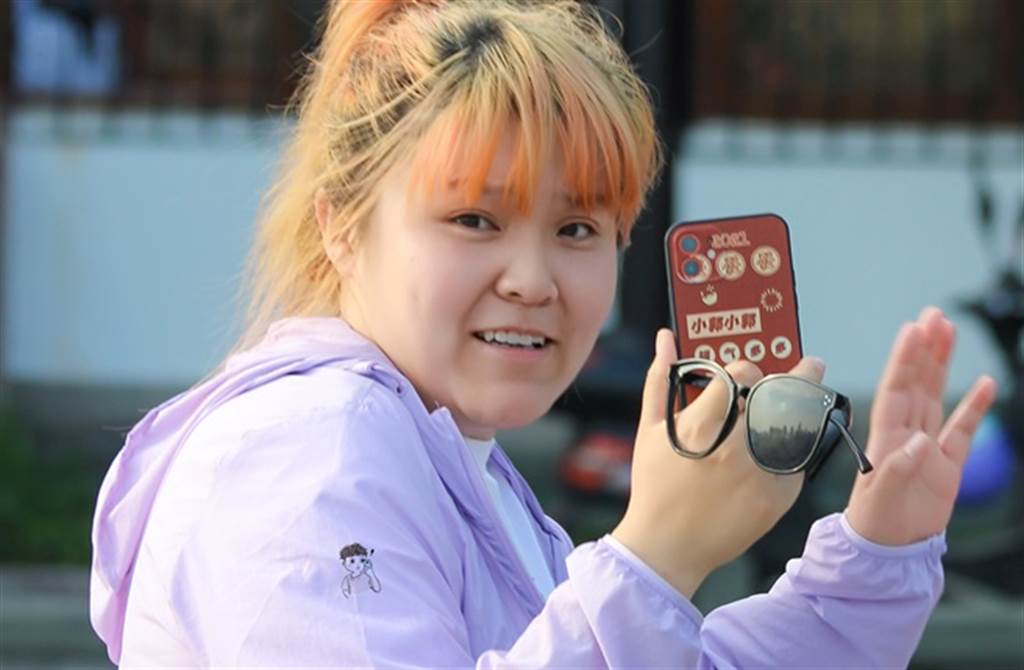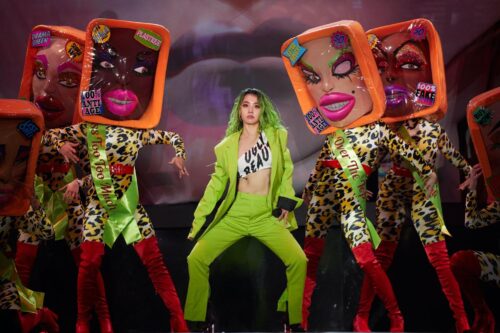Chinese internet personality Guō Bèibèi 郭蓓蓓 had more than 7 million followers on social media before her accounts were banned in September 2021.
The online star was born in 1994, and lives in a rural part of Hebei Province. Posting under the name “Teacher Guo” (郭老师 guō lǎoshī), her rise to fame started in 2019 on Douyin, the Chinese version of TikTok, where she cultivated a loyal following with her spontaneous, highly entertaining livestreams.
Most of the time, audiences would find Guo sitting at home, eating in front of the camera, or talking to her followers about random topics, but her exaggerated mannerisms and deliberately comical way of speaking turned these otherwise ordinary activities into over-the-top parodies.
In a 30-second clip that captures the weirdness of her content, Guo gives a review of a popcorn chicken. “Yóuzhá jī mǐhuā” (油炸鸡米花), she says, articulating the name of the food excruciatingly slowly, in a contrived and peculiar tone that makes the word almost unrecognizable. “I’m going to taste it now,” she continues before popping the food in her mouth. As she chews for a few seconds, her facial expression quickly turns into confusion. “I don’t taste anything…oh, it’s bread crumbs!” She then takes two further bites and becomes silent for one second, after which she says, “No taste at all…it’s still bread crumbs. Hahaha.” Realizing how thick the bread crumbs are and how little meat is wrapped inside, Guo eventually bursts into awkward laughs.
For a food review, the clip takes a few unexpected turns. And according to Tiāntiān 天天, a gay man based in Guangzhou who has been a fan of Guo’s since 2020, it’s the quirkiness that initially drew him in. “She was always brutally subverting viewers’ expectations,” he said.
This feeling was shared by a gay man living in Chengdu, who asked to be identified only as Xuān 轩. “She was very spontaneous,” he said. Xuan recalls that in one of the first videos he encountered about Guo, the internet celebrity spends half a minute eating a kiwi fruit, whose Chinese name is mispronounced by Guo with a heavy accent. After acting creeped out by its appearance, Guo abruptly swallows the entire fruit and makes an odd sound. “No one would talk like her in real life, but I find it quite funny,” Xuan said, comparing Guo to Hong Kong veteran actor Stephen Chow (周星驰 Zhōu Xīngchí), whose unique performance style is characterized as wúlítóu 无厘头 in Chinese.
Wulitou (the Cantonese is mo lei tau), commonly translated as nonsense, is a style of humor originally developed from the local culture in Hong Kong, which later became popular in the Chinese-speaking world through the comedy movies made by director and actor Stephen Chow, whose most famous work includes Shaolin Soccer and Kung Fu Hustle. As summarized by a Duke Storyworlds, the genre features “nonsensical, even crazy parodies, concurrence of contrasts, abrupt surprises in spoken dialogues and action, as well as implausible and deliberate anachronism.”
Similar to wulitou, in her eccentric performances on Douyin, Guo engaged in a variety of lowbrow behavior, such as raising and smelling her own foot in front of the camera or informing viewers that she farted in the middle of a livestream. But it seems to be her strange and amusing speaking style that attracted huge numbers of followers, who jokingly claimed that Guo invented a new language — “Guo’s language” (郭语 guōyǔ). In it, strawberry (草莓 cǎoméi) is pronounced as cumei, I don’t know (不知道 bùzhīdào) as bujidiu, and sisters (姐妹 jiěmèi) as jimei. Guo also created new terms, such as yesimola (耶斯莫拉 yēsīmòlā), a meaningless word used to express a feeling of thrill.
Inspired by Guo’s unique way of speaking, a crop of memes emerged, which catapulted the Douyin star to wider fame outside the short-video-sharing platform. There were a number of quiz videos testing people’s ability to understand the “vocabulary” in guoyu. Several Douyin influencers even accumulated fame by dedicating their accounts to imitating Guo, who was referred to by her fans as the “senior disciple” in guōmén 郭门, literally, “Guo’s cult.”
Interestingly, people in the subculture seemed to be predominantly straight women and queer people. “There was a funny saying that you won’t find a single straight man among Guo’s fans,” Tiantian said.
Xuan describes Guo as “bold,” “original,” and “anti mainstream culture.” He works as an English instructor, and the Douyin algorithm sometimes feeds him videos aiming to correct Chinese people’s English pronunciation or giving advice on how to navigate the workplace. “It feels like everyone is trying to be successful,” he said. In contrast, he finds watching Guo’s nonsensically funny videos to be relaxing. “I like hearing her talking about ordinary things, like what she had for dinner.”
According to Xuan, Guo’s content gave him a respite from the endless conversations about “involution,” or nèijuǎn 内卷 in Chinese, a buzzword widely used by young professionals in urban China to express the prevalent feeling of burnout and desperation in the highly competitive society.
“She embodies a sense of humor that can only be understood by people from the lower social class. She was good at self-mocking,” Xuan remarked. “This makes her relatable for marginalized groups and distinguishes her from most of the male celebrities who only know how to make fun of other people.”
Tiantian added that Guo’s popularity was likely due to the lack of social life in the early days of the COVID-19 pandemic in 2020, when lockdowns led people to binge-watch livestreams. “She really accompanied many people during their difficult times,” he said.
Guo’s popularity eventually extended from the virtual world to the real one. When she visited Nanjing in April 2021 as a tourist, a gauntlet of her followers gathered in front of her hotel, wanting to meet her in person. Overwhelmed by their enthusiasm, which led to a traffic jam, Guo had to cut her trip short. The incident was reported by Nanjing-based state newspaper Yangtze Evening Post, which condemned Guo as deliberately performing “ugliness” and criticized her followers for “indulging in the absurd and bizarre pleasure of appreciating ugliness.”
A few months later, Guo was banned from the Chinese internet. It was not the first time she had encountered censorship, as Xuan recalls that Guo’s livestreams were routinely shut down by Douyin due to “spreading vulgar content.” Previously, Guo managed to work around penalties on the platform by using various alternate accounts.
The suspension in 2021, however, appeared to be permanent. Since then, Guo has completely disappeared from the public eye. According to local media reports, the ban was part of a broader governmental campaign to punish “those who show off ugliness” in pursuit of online fame.
The rhetoric made little sense to Tiantian. “So many male influencers are deliberately acting silly and nonsensical as well, but they are still active and famous on the internet,” he said. “It seems like when a woman gains popularity by acting like a fool, she suddenly becomes a vulgar person.”
Despite the ban, Guo’s legacy can still be found on the Chinese internet. On Douyin, videos of influencers talking in Guo’s style still show up occasionally on Xuan’s feed these days, with the algorithm-based search feature recommending Xuan to watch more related content using the keyword guoyu.
“She really became a cultural phenomenon. We all know that this is guoyu, and it’s from Teacher Guo,” Xuan said. “Guomen will always live on.”

Other LGBTQ stories:
Taiwan grants right of adoption to same-sex couples in latest move toward full equality (CNN)
Taiwan’s legislature passed an amendment on May 16 that allows same-sex couples to jointly adopt a child who is not biologically related to either person. Gay marriage was legalized in Taiwan in 2019, but this specific adoption right was previously limited to heterosexual couples or single people. The legal change was applauded by LGBTQ activists in Taiwan as a step toward full marriage equality.
Chinese official commented on LGBTQ people’s situation in China in a UN conference (UN)
In a recent UN meeting held by the Committee on the Elimination of Discrimination against Women (CEDAW), Chinese delegates were asked by a group of UN experts about LGBTQ people’s situation in the country. A male official responded by claiming that the “Chinese constitution and the legal system do not discriminate against LGBT people” but then said that China’s heterosexual marriage system aligns with its “traditional culture and national conditions.” This happened a few days before the Beijing LGBT Center (北京同志中心), one of the largest organizations serving sexual and gender minorities in the country, announced its permanent shutdown on May 15.
Queer China is our fortnightly round-up of news and stories related to China’s sexual and gender minority population.






